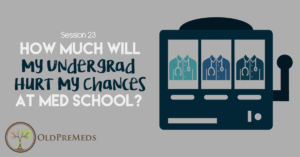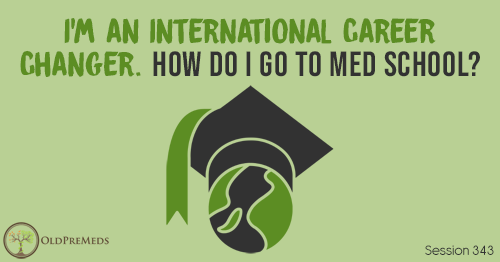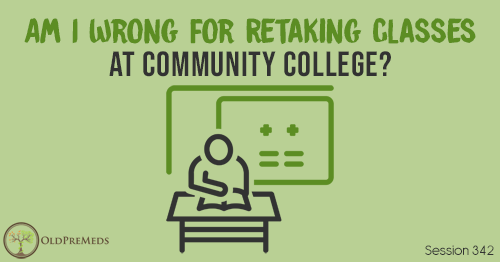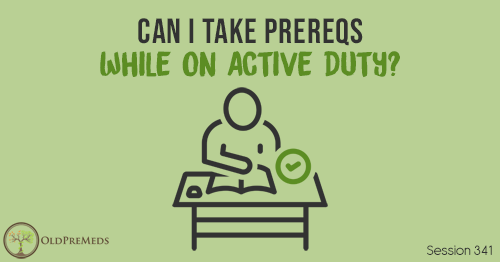Apple Podcasts | Google Podcasts
Session 23
In today’s episode, Ryan and Rich take a question from the forums over at OldPreMeds.org about whether a poor undergraduate school can hurt your chances at getting into medical school.
OldPreMeds Question of the Week:
Scenario: From an NP who wants to go back to medical school; Mom with 2 kids; Has been a nurse practitioner for 5 years and made up her mind to follow her dreams of going to medical school. Enrolled in a community college but worried about her undergraduate science GPA of 2.9 and receiving F in one of her classes.
How much is her undergraduate grades going to haunt her as she tries to move forward?
Here are the insights from Ryan & Rich:
Only 2% of people who apply to PA also apply to MD or DO school.
PA itself seems to become a direct route for people to go into medicine.
It’s a grade baggage you don’t have to worry about
NP course load might be lower than a special master’s program (MPH)
An NP degree is a great accomplishment. Although it won’t directly impact the GPA, it will certainly impress the admissions committee.
How the admissions committee looks at your numbers:
Generally, students get too focused on a single GPA number. Go to the AMCAS and look up what your grade chart will look like (science vs. non-science). This is how an admissions committee sees your grades.
They don’t see a single number, but the net trend and the totals at the bottom to give them a good idea of what your trends are like.
Major takeaway from this episode:
Your undergraduate school days may haunt you but you have plenty of opportunities to overcome them.
Transcript
Introduction
Dr. Ryan Gray: The Old Premeds Podcast is part of the MedEd Media network. Included on that network is the Premed Years, now a two time nominee for Best Podcast in the Science and Medicine category at the Academy of Podcasters. Go check us out over at www.MedEdMedia.com.
This is the Old Premeds Podcast, session number 23.
You’re a nontraditional student entering the medical field on your terms. You may have had some hiccups along the way, or you’re changing careers, you’re now ready to change course and go back and serve others as a physician. This podcast is here to help answer your questions and help educate you on your journey to
Welcome to the Old Premeds Podcast. This is the podcast for the nontraditional premed student. We take our questions directly from the Old Premeds forum over at www.OldPremeds.org. If you don’t have an account over there, it’s easy to sign up, go ask a question. It’s an amazing community of friendly people, unlike some of the other forums out there for premed students, and you have the opportunity to have your question answered here on the podcast, where we take questions every day- or every week as we do the podcast, and answer them here on the podcast. And this week is no different. Let’s go ahead and get Rich on, and we’ll get into this week’s question.
Rich, welcome back, it’s been a couple weeks since you’ve been on with us.
Richard Levy: And how are you doing today, Dr. Ryan?
Dr. Ryan Gray: I’m doing well. I still laugh when you call me Dr. Ryan. It’s kind of funny. Anyway, so we have another question from the Old Premeds forum. This one is from an NP that wants to now possibly go back to medical school. It’s interesting, kind of a sidebar here, I talk to a lot of PA’s and NP’s that are interested in going on and getting their MD. What do you make of that?
NP’s Going Back to Medical School
Richard Levy: I’m not sure. I’d always thought, or the common wisdom would say that people who go to PA and NP were kind of doing it as a secondary program to medicine, and in fact the data shows for PA’s example, that only 2% of people who apply to PA also apply to MD or DO school. And I always thought it would be much higher. There’s a larger overlap with nursing, but PA itself seems to become a direct route for people to go into medicine.
Dr. Ryan Gray: Yeah, well when according to them they’re making still a good amount of money, and with a lot less time, but I think that’s changing a lot now because it seems like the PA route, they’re adding residencies to PA school, and the thing of the past where you could kind of shop around for specialties as you moved along your career. It’s kind of going away. But anyway, we’re talking about medical school here, not PA school. So this nurse practitioner, her biggest questions comes down to her undergraduate years. It’s been a while since she’s been an undergrad, she’s now a mom of two kids, and she’s been a nurse practitioner for five years, and she said- what she’s saying here, she’s finally made up her mind to follow her dreams of going to medical school. Enrolled in community college, but she’s worried about her undergraduate science GPA being 2.9, receiving an F in one of her classes, and she’s wondering how much her undergraduate grades are going to haunt her as she tries to move forward.
Grade Baggage
Richard Levy: It depends on a couple of things, but obviously people who have what I like to call grade baggage do have to worry about it.
Dr. Ryan Gray: I like that one. It’s a good visual.
Richard Levy: Yeah, some people feel like they’re schlepping around the airport with four overloaded suitcases and still have to get through TSA. If the student had- she had a poor undergraduate, if that was directly in nursing, or was it pre-nursing, we don’t know. That would affect on where their grades may wind up in their GPAs for science or non-science. It depends how they were later on; if they were bad say freshman year, that’s a fairly common thing for people to be, and adcoms- I won’t say overlook it, but certainly give it much less impact than other years of your college degree. Also this student, while nurse practitioner presumably was a Master’s program for them, and while Master’s degrees don’t carry the weight to add to your undergraduate GPA, a licensed professional like an NP would likely carry more weight as a completion in the ability to deal with medically related courses. I think it’s safe to say that an NP course load is perhaps slightly lower than say a Special Master’s Program. That’s just my guess- and I’ll use that word ‘guess’ for that.
Dr. Ryan Gray: Especially higher than something like an MPH.
Richard Levy: Yeah completing a Master’s program is at least an accomplishment, but for example if she had mentioned an MPH has virtually no science, not considered hard, a Master’s in a hard science would be worth more, Special Master’s is worth directly, and I think that a clinical professional degree like a nurse practitioner Master’s would be a great accomplishment. While it won’t directly impact the GPA, it will certainly impress an adcom.
Dr. Ryan Gray: Yeah.
Richard Levy: So now the question is, will the old baggage- it has two paths to it. One, they’re now doing some community college work, we don’t know specifically what prerequisites they had as a nurse. Part of the issue with anything with nursing is often the prerequisites for that program are not at the same level that med schools want. One of the issues that nurses and other health professionals have when applying to med school, they assume their coursework previously will count towards their science GPA, as well as their science prerequisites, as well as prepare them for the MCAT. Often none of that is true, and they don’t realize it. So she’s now going to community college though and taking the appropriate courses for prerequisites; the chemistry, the biology, the organic, et cetera, and does well on the MCAT, I think she’ll probably be a good candidate for medical school. The second piece that of course if they are very poor, depending how widespread and how the grade trends were overall, they may want to consider grade replacement and go the DO route. Certainly one of the Old Premed members, Latisha who was a family- she was a nurse midwife and she went on to DO school in her fifties, and I believe she’s a family practice resident now.
Dr. Ryan Gray: Yeah.
Richard Levy: And I’ve also known NP’s who’ve gone off to MD school as well, so it’s not unheard of at all, and I think it’s doable depending on this person’s specific GPA [Inaudible 00:07:48]. And while I’m on that point, just one more note on that, generally students get too focused on a single GPA number. If they go to the AMCAS, there’s a grade conversion PDF that you can simply look up on Google, you can work out what your grade chart will look like, because they look at year by year, and they look at it science versus non-science, and that’s how an adcom sees your grades. They don’t see a single number out in the screen, they see it in that trend and then they see the totals at the bottom. That will give them a good idea of what your trends are like, and what that means to you, and students should do that. It gives them a better idea of what their real GPA is. So a freshman who doesn’t do well in those grades in the three years may be applying to medical schools that are kind of under where he should be, where they in fact should probably look at a little bit more reach schools.
Dr. Ryan Gray: Alright. So yes your undergraduate days are going to haunt you, but you have plenty of opportunity to overcome them. Alright, anything else to add to that one, Rich?
Richard Levy: No I think that’s all.
Final Thoughts
Dr. Ryan Gray: Alright well I hope that answered that question for you. If you have a question, like I said at the beginning of the show, go to www.OldPremeds.org, sign up for an account if you don’t already have one, and ask away.
I do want to take a second to thank a listener who left us a rating and review in iTunes. If you would like to do that, you can do so over at www.OPMPodcast.com/iTunes. That will open up iTunes for you, and you can click on the ‘Leave a Review’ and leave a rating right there. We have great verse commentary says, ‘Can a podcast change your life? This is it.’ They say, ‘This is a top notch podcast for those of us heading to medical school later in life. I’ve gone from saying, “It’s too late,” to “The time is now.” I owe this to Dr. Gray, OPM, and the Medical School Headquarters. Thanks for changing a life, Dr. Gray.’ That is an amazing comment, amazing review, thank you so much for that, whoever you are, great verse commentary.
It’s comments like that, reviews like that, that continue to motivate me, continue to motivate Rich, continue to motivate Allison for The Premed Years. It’s comments like that that just continually kick us in the butt and make us want to continue to do better for you. So if you want to leave us a rating and review, you can do so again, www.OPMPodcast.com/iTunes.
I hope you got a lot of good information out of the show today. Again if you have any questions, www.OldPremeds.org, and until next time, keep pushing, keep moving forward. What you’re doing is going to make a huge difference in your life, and your patients’ lives in the future.












